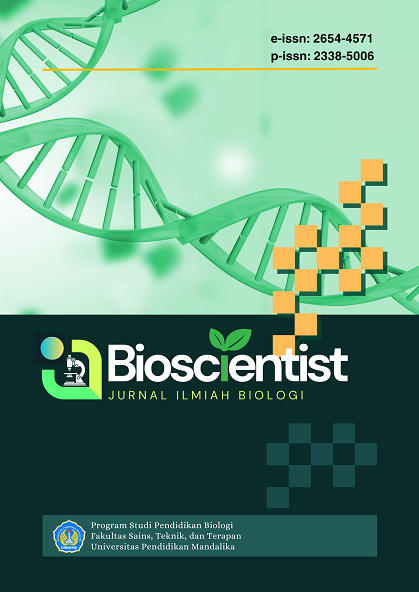Sasaknese Traditional Games as a Medium for Strengthening Science Literacy: Preservice Teachers’ Perceptions
DOI:
https://doi.org/10.33394/bioscientist.v13i1.15228Keywords:
sasaknese traditional games, science literacy, preservice teachers’ perceptionsAbstract
This study aims to explore the perceptions of preservice teachers regarding sasaknese traditional games as a medium for strengthening science literacy. This exploratory research was conducted at the Mandalika University of Education with a subject pool of 234 preservice teacher students. The research utilized a validated closed questionnaire instrument with responses gathered using a Likert scale. The data from this study were analyzed using quantitative descriptive statistics. The results of this study are Sasaknese traditional games have great potential as an effective medium for strengthening science literacy among preservice teachers. Positive perceptions were shown by the majority of respondents across various categories, including gender, semester level, and regional origin. Male students tended to show higher levels of agreement compared to female students, while students in their final semester (semester VII) demonstrated a deeper understanding and appreciation for the use of traditional games in science education. Similarly, positive perceptions were evenly distributed across the Lombok Island region, indicating that local wisdom is widely accepted as a contextual approach in education.References
Aikenhead, G. S. (2006). Science education for everyday life: Evidence-based practice. Teachers College Press.
Alfiah, L. N., Rokhim, D. A., & Wulandari, I. A. I. (2020). Perbedaan Minat Berwirausaha Berdasarkan Jenis Kelamin Mahasiswa. Jurnal Administrasi Dan Manajemen Pendidikan, 3(3). https://doi.org/10.17977/um027v3i32020p208
Bybee, R. W. (2013). The case for STEM education: Challenges and opportunities. NSTA Press.
Cohen, L., Manion, L., & Morrison, K. (2021). Ex post facto research. In Research Methods in Education. https://doi.org/10.4324/9780203224342-17
Fink, A. (2011). How to Sample in Surveys. In How to Sample in Surveys. https://doi.org/10.4135/9781412984478
Fraenkel, J. R., Wallen, N. E., & Hyun, H. H. (2012). How to Design and Evaluate Research in Education, 8th Edition (2012). In Climate Change 2013 - The Physical Science Basis (Vol. 53, Issue 9).
Gay, G. (2010). Culturally responsive teaching: Theory, research, and practice (2nd ed.). Teachers College Press.
Hermawan, D., Fitriani, A., & Ramdhani, M. A. (2020). Gender differences in students’ scientific literacy based on local wisdom-based science learning. Jurnal Pendidikan IPA Indonesia, 9(2), 234–243. https://doi.org/10.15294/jpii.v9i2.24004
Jegede, O. J., & Aikenhead, G. S. (1999). Transcending cultural borders: Implications for science teaching. Research in Science & Technological Education, 17(1), 45–66. https://doi.org/10.1080/0263514990170104
Joshi, A., Kale, S., Chandel, S., & Pal, D. (2015). Likert Scale: Explored and Explained. British Journal of Applied Science & Technology, 7(4). https://doi.org/10.9734/bjast/2015/14975
Kerlinger, F. N., & Lee, H. B. (2011). Foundations of Behavioral Research: The Most Sustainable Popular Textbook by Kerlinger & Lee (2000). Journal of Social Development, 13(2).
Kurniasih, D., & Suryadi, D. (2018). Calon guru sains dan etnosains dalam pembelajaran IPA. Jurnal Pendidikan Sains Indonesia, 6(1), 13–22. https://doi.org/10.24815/jpsi.v6i1.9713
Lestari, P., & Widodo, A. (2019). Etnosains dalam pendidikan: Integrasi budaya lokal dalam pembelajaran sains untuk membangun karakter bangsa. Cakrawala Pendidikan, 38(3), 511–520. https://doi.org/10.21831/cp.v38i3.26085
Nugraha, S., Nurhayati, N., & Suryana, D. (2020). Ethnoscience-oriented science learning to improve students’ scientific literacy. Jurnal Ilmiah Pendidikan Fisika Al-Biruni, 9(2), 215–228. https://doi.org/10.24042/jipfalbiruni.v9i2.6412
Nurdin, H., Susilawati, S., & Ningsih, E. K. (2021). Pembelajaran berbasis budaya lokal dalam meningkatkan literasi sains siswa sekolah dasar. Jurnal Inovasi Pendidikan Dasar, 7(1), 32–40. https://doi.org/10.22219/jipd.v7i1.16358
Muliadi, A., Mirawati, B., & Prayogi, S. (2021). The Effect Entrepreneurship Education and Subjective Norm on Biology Students’ Self-Efficacy in Entrepreneurial. Prisma Sains : Jurnal Pengkajian Ilmu Dan Pembelajaran Matematika Dan IPA IKIP Mataram, 9(1). https://doi.org/10.33394/j-ps.v9i1.3981
OECD. (2018). The future of education and skills: Education 2030 framework. OECD Publishing. https://www.oecd.org/education/2030
OECD. (2019). PISA 2018 results (Volume I): What students know and can do. OECD Publishing. https://doi.org/10.1787/5f07c754-en
Semali, L. M., & Kincheloe, J. L. (Eds.). (1999). What is indigenous knowledge? Voices from the academy. Falmer Press.
Suwardana, I. N. G., Suardana, I. B. R., & Sutrisna, I. M. (2022). Persepsi mahasiswa terhadap penggunaan budaya lokal sebagai media pembelajaran IPA di era digital. Jurnal Pendidikan dan Pembelajaran Sains Indonesia, 6(1), 23–33. https://doi.org/10.23887/jpps.v6i1.39654
Takona, J. P. (2024). Research design: qualitative, quantitative, and mixed methods approaches / sixth edition. In Quality and Quantity (Vol. 58, Issue 1). https://doi.org/10.1007/s11135-023-01798-2













